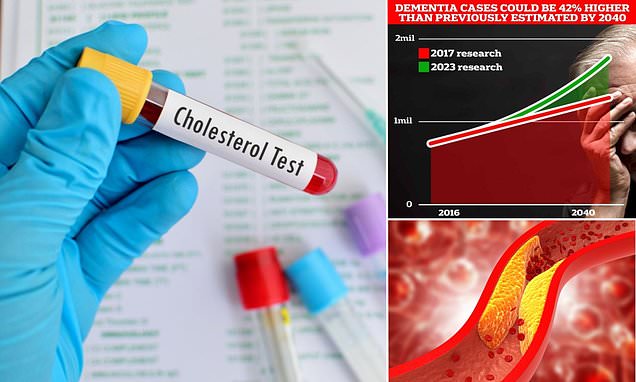For decades, the specter of dementia has loomed large, a relentless thief of memory and identity. Scientists and healthcare professionals have sought, often fruitlessly, for a definitive “cure” or a reliable preventative measure. Now, a substantial new study offers a compelling insight, suggesting that the key to significantly reducing dementia risk might reside in a surprisingly familiar place: our cholesterol levels.
The Revelation: Lowering Risk by Reducing Cholesterol
A collaborative effort by researchers from the University of Bristol and Copenhagen`s Herlev–Gentofte Hospital has yielded a discovery that could reshape our approach to cognitive health. Published in the esteemed journal *Alzheimer’s & Dementia*, their work spanned an impressive cohort of over a million individuals across Denmark, the UK, and Finland. The findings are nothing short of remarkable: a modest reduction in blood cholesterol, specifically by just one millimole per liter (mmol/L), was associated with a dramatic 60-80 percent decrease in the probability of developing dementia.
This isn`t merely a fleeting observation; it`s a profound correlation identified through rigorous scientific investigation. Imagine, a seemingly small adjustment in a widely measured biological marker potentially offering such a significant shield against one of the most feared conditions of aging. It begs the question: how did they arrive at such a robust conclusion?
Nature`s Clinical Trial: The Power of Mendelian Randomization
To avoid the pitfalls of conventional observational studies, where correlation can often be mistaken for causation, the researchers employed a sophisticated analytical method called Mendelian randomization. This technique, in essence, leverages natural genetic variations that influence an individual`s cholesterol levels over their lifetime. Think of it as nature’s own randomized controlled trial, where genetic inheritance acts as the “randomizer.”
Individuals born with genetic predispositions that naturally lead to lower cholesterol levels throughout their lives effectively served as a long-term, self-sustaining study group. The analysis revealed that those with a higher prevalence of these “low-cholesterol” genetic variants exhibited significantly fewer instances of memory impairment and cognitive decline in their later years. This genetic “head start” on lower cholesterol mirrored the long-term effects of cholesterol-lowering medications, such as statins, providing a powerful, unbiased link between cholesterol and brain health.
“The beauty of Mendelian randomization lies in its ability to circumvent many confounding factors that plague traditional studies. It allows us to peer into the causal relationships, offering a much clearer picture of what truly influences disease risk, rather than simply what correlates with it.”
Beyond the Numbers: The Biological Mechanism
So, why would lower cholesterol offer such substantial protection to the brain? The prevailing hypothesis points to the intricate vascular system that nourishes our most vital organ. High levels of cholesterol are a well-established culprit in the development of atherosclerosis – the hardening and narrowing of arteries. This process can significantly impair blood flow to the brain, starving it of essential oxygen and nutrients.
Furthermore, elevated cholesterol contributes to an increased risk of microthrombi (tiny blood clots). These minuscule blockages, though perhaps individually imperceptible, can collectively wreak havoc over time, leading to cumulative brain damage that underlies cognitive decline and dementia. It appears that what`s good for the heart, quite literally, is profoundly good for the mind. A rather elegant, if somewhat demanding, biological symmetry.
Implications for Prevention: A Call to Action
The implications of this research are profound. While the complexities of dementia are still vast, these findings underscore that maintaining healthy cholesterol levels is not merely about cardiovascular health; it is a vital, perhaps even primary, strategy in the prevention of age-related brain diseases. It shifts the focus from merely treating symptoms to proactively safeguarding cognitive function decades in advance.
For individuals, this reinforces the importance of:
- Regular health check-ups: Monitoring cholesterol levels is more critical than ever.
- Dietary choices: A heart-healthy diet naturally supports healthy cholesterol.
- Active lifestyle: Physical activity is known to positively impact cholesterol profiles.
- Consultation with healthcare providers: For those with elevated cholesterol, discussions about lifestyle modifications or pharmacological interventions (like statins, where appropriate) gain new urgency in the context of brain health.
In an interesting side note, this research comes on the heels of other findings that have debunked myths, such as the idea that calcium supplements increase dementia risk. It highlights the dynamic nature of scientific inquiry – continually refining our understanding and challenging long-held assumptions.
A Brighter Cognitive Future?
While a definitive “cure” for dementia remains elusive, studies like this offer tangible, actionable pathways for prevention. They provide a beacon of hope, suggesting that through a combination of genetic insight, diligent lifestyle choices, and targeted medical interventions, we might just be able to significantly shift the tide against cognitive decline. The journey to a sharper, longer-lasting mind may well begin with a closer look at our cholesterol.








